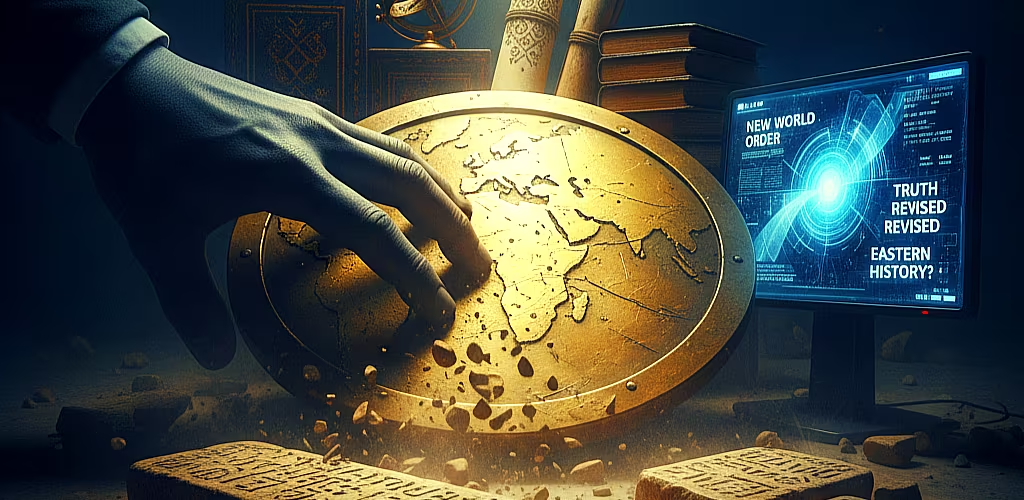The Western Gaze on the East: The Battle to Rewrite History
Medium | 12.11.2025 05:40
The Western Gaze on the East: The Battle to Rewrite History
A Natural Phenomenon or a Collective Conspiracy?
11 min read
·
Just now
--
**
By: Masoud Khalife
November 2025
**
The Question: Why?
Western policy aggressively seeks to erase the Middle East, its peoples, and their achievements from history, presenting a distorted version of truth to the world today. While it marginalizes almost all non-Western cultures, its approach toward the people of this region has been notably more ruthless and calculated.
**
Defining Terms Before Entering History
First, we must liberate meanings from exclusivity.
The West, Western Policy, The Western World — ostensibly geographical concepts, but in reality, they refer to a historical power structure: Wealthy, male-dominated, Christian white people (predominantly Catholic and Protestant), rooted in Norse, Germanic, and Frankish tribes. Today, "NATO" serves as the political face of this structure. Therefore, whenever we use "The West," we refer to this affluent Western white elite class which, through centuries of narrative construction and rewriting, has crowned itself the "Center of the World."
The term "Middle East" itself is problematic. Middle relative to what standard? The middle of where?
In antiquity, the earth was not naturally divided; cultural and trade continuity flowed from Japan and China in the East to Spain and the Horn of Africa in the West. At the heart of this expanse, civilizations in Iran, India, Mesopotamia, and Egypt flourished—lands which the West later arbitrarily designated as "The East" to define itself as "The Center." This perspective became institutionalized as Eurocentrism: a cultural and historical worldview that posits Europe as the axis of the world, relegating other civilizations to the margins, deeming them incomplete or backward.
**
The Superiority of the Ancient East over the Old West
In ancient times, the East was the epicenter of knowledge and social welfare. Eastern civilizations led the West in science, medicine, astronomy, mathematics, and architecture. This is not an assertion; it is documented fact. From Sumer to India, from Babylon to Egypt and Iran, scientific and philosophical progress was brilliant.
During the same era, many Western regions still lacked cohesive political and scientific structures. Even the Roman Empire—which the West today claims as its heritage—was racially and culturally closer to the Middle East than to the northern European tribes. Greeks and Romans called the fair-haired, light-eyed people of the north "barbarians": uncivilized and savage. Yet, today, those very faces have become the image of "civilization," and even the face of "Christ," in paintings and films. This reversal of imagery is not accidental; it is deeply rooted in the same Eurocentrism that has redefined history for centuries.
**
Colonialism, Imperialism, and Narrative Engineering
From the 15th to the 20th century, European powers like Britain, France, and Spain colonized vast parts of the Middle East, Africa, and Asia. To justify this dominance, they constructed a narrative where non-Western civilizations appeared "savage" and "stagnant." Western historians deliberately minimized the achievements of Sumerian, Iranian, Egyptian, and Islamic civilizations to make European supremacy seem "natural." In their books, the East was reduced to an "emotional and irrational region"—precisely the image Western media projects onto the Middle East today. This approach was not just for political control—it was for establishing cultural superiority. Because whoever controls the culture controls the mind, and whoever controls the mind rewrites history.
**
Deliberate Distortion and Omission
No Western university will readily tell you that the founders of the scientific method were people with wheat-colored skin, dark eyes, and curly beards; the very faces today often framed as "terrorists" by their media. Names like Al-Khwarizmi, Al-Biruni, Omar Khayyam, Al-Razi, Avicenna (Ibn Sina), Al-Farabi, and hundreds of other thinkers were not merely Islamic scholars, but the pillars of global science. Yet, in Western textbooks, they are often eliminated or marginalized.
Even modern scientific terms have Eastern roots: Algebra from Al-Jabr, Algorithm from Al-Khwarizmi, Alcohol from Al-Kuhl, Alchemy from Al-Kimiya, Zenith and Nadir from Samtu r-Ra's and Nazir. The West adopted them, changed the names, and erased the origin. This is not mere distortion; it is Cultural Appropriation.
**
The East’s Own Failures
However, the truth is not solely external. Grave errors have also occurred within the East. One cannot overlook the self-betrayal, indifference, and blind fanaticism. For centuries, the people of the East themselves allowed knowledge to perish—sometimes out of fear, sometimes out of ignorance, sometimes out of "sacred ignorance."
The burning of libraries are indelible stains on human memory: Alexandria, Jundishapur, Baghdad, and Neyshabur—thousands of volumes of philosophical, scientific, and literary works were destroyed in the flames. Hands that feared "knowing" were involved in this destruction. If the East failed to be the custodian of its own heritage, it is easier for the West to appropriate it. This omission must not be lightly dismissed; self-forgetfulness is the greatest treason.
**
A Revision of Human History
Civilization is the result of global cooperation. No single race planted the tree of knowledge alone. Knowledge has been passed from hand to hand: from China to Mesopotamia, from Egypt to Al-Andalus, from India to Greece. We must view history as the shared legacy of humanity, not a competitive field between East and West. The manipulation of history for power is the most dangerous form of lie—one that casts a shadow over generations.
We must simultaneously acknowledge that people in the West were also victims of these systems, and their role in advancing science cannot be dismissed. This article should not be interpreted as saying, "The East was a promised paradise, and the West the enemy of its progress." If we follow the thread of human progress, we will see that groups everywhere on this planet have always played a significant role.
As the Persian poet Saadi said:
بنی آدم اعضای یک پیکرند
که در آفرینش ز یک گوهرند
The Children of Adam are limbs of one body,
Having been created of one essence
**
The West and the Historical Complex from the East
There was a time when the West feared the East. In the Middle Ages, the Islamic world was the center of science and philosophy, while Europe lived in the shadows of ignorance. When the West gained power during the colonial era, this historical fear morphed into a psychological complex. To compensate for that historical humiliation, it chose domination, appropriation, and degradation. The rewriting of history and the belittling of the East was an unconscious reaction to that past feeling of historical inferiority.
**
New Enlightenment in the West
However, not everything is bleak. In modern Western universities, movements have emerged striving to correct this view. Disciplines like World History and Postcolonial Studies seek to restore the contributions of non-Western civilizations to the formation of human knowledge. The role of Muslims in preserving and translating Greek texts, advancing mathematics, astronomy, medicine, and even inventions like the compass and printing, is now recognized in many new academic sources. These efforts signal the beginning of an awakening—but there is a long way to go before "The Center" loses its self-proclaimed meaning once more.
**
From Distortion to the New World Order
When we combine the rewriting of history with politics and media, we arrive at the concept known today as the New World Order. Ostensibly, this term began after the Cold War, when major powers sought to build a new system to control global resources, thought, and economy. But on a deeper level, it can be seen as a continuation of the same process: a continuation of Eurocentrism, colonialism, and soft domination through "Narrative Control."
**
A Natural Phenomenon or a Conspiracy Disguised as Nature?
Power always writes the narrative—that is the law of history. But when all media and scientific institutions serve a single narrative, we are no longer facing nature; we are facing a system that "makes the conspiracy appear natural." This is the point where we must ask: Has truth itself become a tool of politics?
**
Conclusion
The rewriting of history is not just the work of politicians; it is the work of anyone who exploits "truth" for self-interest. Whoever controls the mind controls the past and the future. And this is the hidden battle of our time: The Battle for the Narrative. A narrative that either we write—or others will write for us.
نگاه غرب به شرق: نبرد بازنویسی تاریخ علیه شرق
پدیدهای طبیعی یا دسیسهای جمعی؟
مسعود خلیفه
نوامبر ۲۰۲۵
**
چرا؟
سیاست غرب بر آن است که خاورمیانه، مردمانش و دستاوردهایشان را از تاریخ پاک کند و چهرهای وارونه از حقیقت پیش چشم مردم امروز بگذارد.
نه فقط خاورمیانه، بلکه همهی فرهنگهای جهان را در حاشیه مینشاند، اما در برابر مردمان این منطقه، بیرحمانهتر و آگاهانهتر عمل کرده است.
**
تعریف واژهها پیش از ورود به تاریخ
پیش از هر چیز باید معناها را از انحصار بیرون کشید.
غرب، سیاست غرب، دنیای غرب — در ظاهر مفاهیمی جغرافیاییاند، اما در واقع اشاره دارند به ساختاری تاریخی از قدرت: سفیدپوستان مسیحی، عمدتاً کاتولیک و پروتستان، ثروتمند و مردسالار، با ریشههایی در اقوام نورث، ژرمن و فرانک.
اگر بخواهیم امروز مصداقی بیاوریم، «ناتو» چهرهی سیاسی همان ساختار است.
پس هرجا گفتیم «غرب»، مرادمان طبقهی سفیدپوستِ ثروتمندِ غربی است که طی قرنها با ساختن و بازنویسی روایتها، خود را «مرکز جهان» معرفی کرده است.
اما خودِ واژهی «خاورمیانه» نیز مسئلهدار است.
شرقِ میانه نسبت به کدام معیار؟ میانهی کجا؟
در دوران باستان، زمین بهصورت طبیعی تقسیم نمیشد؛ از ژاپن و چین در شرق تا اسپانیا و شاخ آفریقا در غرب، پیوستگی فرهنگی و تجاری جریان داشت.
در میانهی این پهنه، تمدنهایی در ایران، هند، میانرودان و مصر شکوفا شدند — سرزمینهایی که بعدها غرب آنها را بهدلخواه «شرق» نامید تا خود را «مرکز» تعریف کند.
این نگاه بعدها در قالب پدیدهای به نام یوروسنتریسم (Eurocentrism) نهادینه شد:
دیدگاهی فرهنگی و تاریخی که اروپا را محور جهان میپندارد و تمدنهای دیگر را در حاشیه، ناقص یا عقبمانده معرفی میکند.
**
برتری شرق باستان بر غرب کهن
در روزگاران باستان، شرق مرکز دانش و رفاه اجتماعی بود.
تمدنهای شرقی در علم، پزشکی، نجوم، ریاضیات، و معماری از غرب پیشتر بودند. این ادعا نیست، سند است.
از سومر تا هند، از بابل تا مصر و ایران، پیشرفت علمی و فلسفی درخشان بود.
در همان دوران، بسیاری از مناطق غربی هنوز ساختار سیاسی و علمی مدون نداشتند.
حتی امپراتوری روم — که امروز غرب خود را وارث آن میداند — از نظر نژادی و فرهنگی نزدیکتر به خاورمیانه بود تا اقوام شمالی اروپا.
یونانیان و رومیان، مردمان شمال با موهای بور و چشمان روشن را «بربر» مینامیدند؛ بیتمدن و خشن.
اما امروز همان چهرهها در نقاشیها و فیلمها، چهرهی «تمدن» و حتی چهرهی «مسیح» شدهاند.
این وارونگیِ تصویری، تصادفی نیست؛ ریشه در همان یوروسنتریسم دارد که قرنهاست تاریخ را بازتعریف میکند.
**
استعمار، امپریالیسم و مهندسی روایت
از قرن پانزدهم تا بیستم، قدرتهای اروپایی چون بریتانیا، فرانسه و اسپانیا بخشهای وسیعی از خاورمیانه، آفریقا و آسیا را استعمار کردند.
برای توجیه این سلطه، روایتی ساختند که در آن، تمدنهای غیرغربی «بربر» و «عقبمانده» جلوه میکردند.
تاریخنگاران غربی عمداً دستاوردهای تمدنهای سومری، ایرانی، مصری و اسلامی را کماهمیت نشان دادند تا برتری اروپا طبیعی جلوه کند.
در کتابهایشان، شرق به «منطقهای احساسی و بیمنطق» تبدیل شد؛ درست همان تصویری که امروز رسانههای غربی از خاورمیانه میسازند.
این نگاه، فقط برای تسلط سیاسی نبود — بلکه برای تثبیت برتری فرهنگی.
زیرا هرکه فرهنگ را کنترل کند، ذهن را کنترل میکند، و هرکه ذهن را در اختیار بگیرد، تاریخ را نیز بازمینویسد.
**
تحریف و فراموشی آگاهانه
در هیچ دانشگاه غربی نمیگویند بنیانگذاران روش علمی، مردمانی با پوست گندمگون، چشمان تیره و ریشهای مجعد بودند؛
همان چهرههایی که امروز در رسانههایشان چهرهی «تروریست» تلقی میشود.
نامهایی چون خوارزمی، ابوریحان بیرونی، خیام، رازی، ابنسینا، فارابی و صدها اندیشمند دیگر، نه فقط دانشمندان اسلامی، بلکه ستونهای علم جهانیاند.
اما در کتابهای درسی غرب، اغلب یا حذف شدهاند یا به حاشیه رفتهاند.
حتی واژههای علمی مدرن ریشه در زبانهای شرقی دارند:
Algebra از «الجبر»، Algorithm از «الخوارزمی»، Alcohol از «الکحل»، Alchemy از «الکیمیاء»، Zenith و Nadir از «سمت الرأس» و «نظیر».
غرب آنها را گرفت، نامها را تغییر داد و منشأ را محو کرد.
چنین کاری فقط تحریف نیست؛ تصاحب فرهنگی است.
**
قصورات خودِ شرق
اما حقیقت، فقط در بیرون نیست.
در درون شرق نیز خطاهای سهمگینی رخ داده است.
نمیتوان از خیانت به خود، از بیتفاوتی و تعصب کور گذشت.
در قرنهای متوالی، خودِ مردمان شرق اجازه دادند دانش از میان برود — گاه از ترس، گاه از نادانی، گاه از جهلِ مقدس.
آتشسوزیهای کتابخانهها لکههایی پاکنشدنی بر حافظهی بشرند:
کتابخانهی اسکندریه، جندیشاپور، بغداد و نیشابور — هزاران جلد از آثار فلسفی، علمی و ادبی در شعلهها نابود شد.
دست کسانی در این ویرانی بود که از «دانستن» میترسیدند.
اگر شرق خود حافظ میراث خویش نبود، طبیعی است که غرب آن را مصادره کند.
از این قصور نباید ساده گذشت؛ فراموشیِ خود، بزرگترین خیانت است.
**
نابودی دانش بشری و نقش تصادف
دانش بشری، قربانی جنگ، ترس و گاه تصادف شد.
در بسیاری از موارد، کتابها و اسناد علمی یا به آتش کشیده شدند یا در دریاها غرق گشتند.
مذهب، سیاست و طمع، همگی در این نابودی نقش داشتند.
با اینحال، گاه شانس دخالت کرده: نسخههایی که در خمرهها و غارها پنهان شدند، قرنها بعد بهصورت معجزهآسا کشف شدند — یادگارهایی از آن دوران که خود گواه تاریخ هستند.
**
بازنگری در تاریخ انسان
تمدن، حاصل همکاری همهی انسانهاست.
هیچ نژادی درخت دانش را به تنهایی نکاشته.
دانش از چین تا بینالنهرین، از مصر تا آندلس، از هند تا یونان، دستبهدست گشته است.
باید تاریخ را چون میراث مشترک بشریت ببینیم، نه میدان رقابت میان شرق و غرب.
تحریف تاریخ برای قدرت، خطرناکترین شکل دروغ است — دروغی که بر ذهن نسلها سایه میافکند.
اما همزمان باید به این نکته نیز توجه کنیم که مردمان غرب خود نیز دچار چنین سیستم هایی بودند ، و از نقش آنها در پیشبرد علوم نمیتوان گذشت. این مطلب نباید چنین برداشت شود که آری، شرق بهشت معود بوده و غرب دشمن پیشرفتهای آن ، درصورتیکه اگر رشته نخ پیشرفتهای بشری را دنبال کنیم خواهیم دید که همیشه همه جای این کره خاکی گروهی نقشی مهم در این زمینه داشته اند.
همچون سعدی که گفت:
بنی آدم اعضای یک پیکرند
که در آفرینش ز یک گوهرند
**
اما غرب و عقدهی تاریخی از شرق
زمانی که غرب از شرق میترسید. در قرون وسطی، جهان اسلام مرکز علم و فلسفه بود، در حالیکه اروپا در تاریکی جهل میزیست.
وقتی غرب در عصر استعمار قدرت گرفت، این ترس تاریخی به عقدهای روانی بدل شد.
برای جبران آن حقارت، سلطه، تصاحب و تحقیر را برگزید.
بازنویسی تاریخ و تحقیر شرق، واکنشی ناخودآگاه به همان احساس حقارت تاریخی بود.
**
روشنفکری نوین در غرب
با این حال، همهچیز تاریک نیست.
در دانشگاههای مدرن غرب، جنبشهایی پدید آمدهاند که تلاش میکنند این نگاه را اصلاح کنند.
رشتههایی چون تاریخ جهانی (World History) و مطالعات پسااستعماری (Postcolonial Studies) در پی آناند که سهم تمدنهای غیرغربی را در شکلگیری دانش بشری بازیابند.
نقش مسلمانان در حفظ و ترجمهی متون یونانی، گسترش ریاضیات، نجوم، پزشکی و حتی اختراعاتی چون قطبنما و چاپ، اکنون در بسیاری از منابع علمی جدید مورد توجه قرار گرفته است.
این تلاشها نشانهی آغاز بیداریاند — اما راهی طولانی پیش روست تا «مرکز» بار دیگر معنای خود را از دست بدهد.
**
از تحریف تا نظم نوین جهانی
اگر بازنویسی تاریخ را در کنار سیاست و رسانه بگذاریم، به مفهومی میرسیم که امروز با عنوان نظم نوین جهانی (New World Order) شناخته میشود.
در ظاهر، این اصطلاح از پایان جنگ سرد آغاز شد، زمانی که قدرتهای بزرگ خواستند نظامی تازه برای کنترل منابع، افکار و اقتصاد جهانی بسازند.
اما در لایههای عمیقتر، میتوان آن را ادامهی همان روند دانست:
ادامهی یوروسنتریسم، استعمار، و سلطهی نرم از طریق «کنترل روایت».
**
پدیدهای طبیعی یا توطئهای در لباس طبیعت؟
قدرت، همیشه روایت را مینویسد — این قانون تاریخ است.
اما وقتی همهی رسانهها و نهادهای علمی در خدمت یک روایت قرار میگیرند، دیگر با طبیعت روبهرو نیستیم، با نظامی روبهروایم که «توطئه را طبیعی جلوه میدهد».
این همان جایی است که باید پرسید: آیا حقیقت، خود به ابزار سیاست بدل نشده است؟
**
نتیجه
بازنویسی تاریخ فقط کار سیاستمداران نیست؛ کار هرکسی است که از «حقیقت» برای منافع خود بهره میگیرد.
هر که ذهن را در اختیار بگیرد، گذشته و آینده را نیز در مشت دارد.
و این همان نبرد پنهان عصر ماست: نبرد برای روایت.
روایتی که یا ما آن را مینویسیم — یا دیگران بهجای ما خواهند نوشت.









